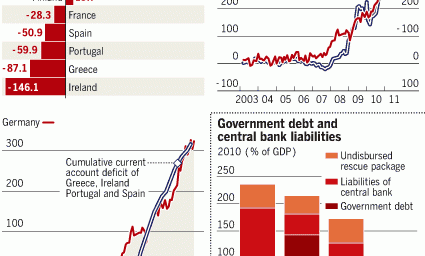Eurozone Crisis Panics Markets
A mustachioed German has once again sent the world into panic. This time, it involves euros not tanks.
A mustachioed German has once again sent the world into panic. This time, it involves euros not tanks.
The markets took another hard hit today following the abrupt resignation of Jürgen Stark, Germany’s member of the European Central Bank’s board. The euro hit six month lows against the dollar, bank stocks tumbled five percent, the Dow was down 3 percent, and the FTSE All-World index fell 3.07 percent amid near certainty that Greece would default on its debt and send another shockwave throughout the Eurozone.
[…]
My colleague Alexei Monsarrat, director of the Atlantic Council’s Global Business and Economics program, believes “Mr. Stark’s departure deeply underscores the existential decisions facing Europe – decisions that are largely in Germany’s hands. With this move, Stark is attempting to wrench the ECB back from its expanded role and striking a blow to Angel Merkel’s efforts to rally German support for efforts to shore up Europe’s periphery. This deepens uncertainty about the ECB’s future moves amplifies Germany’s internal divisions over its approach to Europe.”
More at my New Atlanticist post, “Key Resignation Another Blow to Eurozone Stability.”







Big picture … it is interesting that European news seems more able to move markets in September 2011 than domestic policy twists and turns …
perhaps it is the wrong time for a US-centric economic view.
Not too surprising unfortunately, I’ve been reading that Europe has a worse outlook than the US for a while. Not too comforting for us though, I don’t imagine that Europe can have a huge downturn that doesn’t affect the USA.
I am so bitter. I spend 8 months in Italy paying 1.60 for a Euro. Now it’s 1.35?
@David M:
I have to agree with you on this one. Like in the physical world, in today’s global economy, you can’t do one thing. It’s almost a law of nature in it’s own right.
If Greece does default (and I think that’s a near certainty), I expect the impact even in the US will be severe. It might even be severe enough to trigger a double-dip recession.
-Polaris
@Polaris: Greece isn’t the problem because its economy is too small to have all that much impact. Italy however, is being kept afloat solely by the ECB. If Italy’s economy crashes there’s no way to avoid a deep recession in Europe, and that will bleed over into the U.S. and Asia.